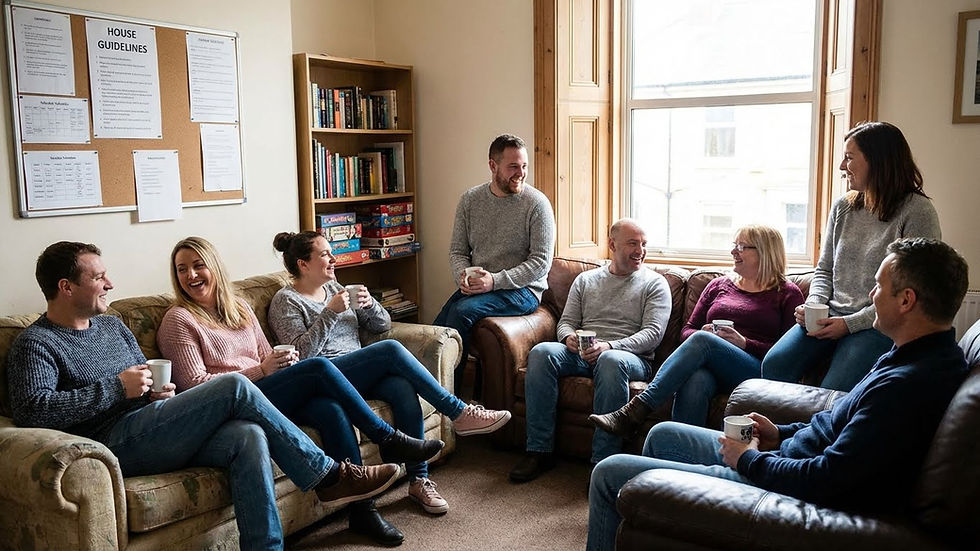Avoiding Triggers Post Sober Living Home: How to Stay Grounded in Your Recovery Journey
- SMC Team
- Sep 18, 2025
- 3 min read

Completing your stay in a sober living home is a major milestone! You’ve done the work, embraced structure, and surrounded yourself with a community that understands and supports your sobriety. But what happens after you leave that supportive environment? For many individuals in recovery, the transition back into the "real world" can feel overwhelming. That’s where having a strong plan for avoiding triggers post sober living home becomes essential.
Understanding What Triggers Are
Triggers are anything that can spark cravings or the desire to return to old habits. They can be emotional, environmental, or even social.
Examples include:
Running into people you used to use with
Attending a party or event where substances are present
Feeling stressed, lonely, or bored
Visiting locations associated with past substance use
Recognizing your personal triggers is the first step toward managing them effectively. When you identify what affects you most, you gain the power to plan, avoid, or navigate those situations in a healthier way.
How to Effectively Avoid Triggers Post Sober Living Home: Rebuild Your Routine with Intention
A structured daily routine was likely a cornerstone of your time at Aloha House. That same structure can serve you well after you transition out. Establishing a consistent schedule reduces the mental space for impulsive decisions and helps keep you focused.
Here are some components to include in your daily routine:
Morning mindfulness or meditation
Healthy meals and hydration
Physical activity, such as walking, yoga, or gym time
Work or purposeful engagement
Recovery support (meetings, sponsor check-ins, etc.)
Evening wind-down without screens
By keeping yourself busy in a constructive way, you're actively avoiding triggers post sober living home by limiting idle time and reinforcing positive habits.
Build a Support Network Outside the Sober Living Environment
During your stay in a sober living home, you likely formed close bonds with housemates who were on similar journeys. While those relationships are invaluable, it’s crucial to broaden your support network.
Start by identifying people in your life who respect your recovery and encourage healthy choices.
This can include:
Family members
Trusted friends
Therapists or counselors
Faith-based or community mentors
Also, don't underestimate the power of local or virtual recovery groups. Staying connected to people who "get it" provides ongoing accountability and inspiration!
Set Boundaries Without Guilt
Saying no is not just an option—it's a necessity. Setting and enforcing boundaries is a vital part of avoiding triggers post sober living home.
This might mean:
Declining invitations to events where alcohol or drugs will be present
Stepping away from relationships that don't support your sobriety
Removing yourself from toxic work environments or social media spaces
You don’t owe anyone an explanation for protecting your recovery. It’s your life, and your health and happiness come first.
Have a Trigger-Response Plan
Avoidance is ideal, but it’s not always possible. Life happens. So, what do you do when you can’t sidestep a trigger? Develop a personal response plan.
This may include:
Calling a sponsor or accountability partner
Practicing deep breathing or grounding exercises
Removing yourself from the triggering environment
Journaling to process emotions
This approach ensures that even when faced with a challenge, you have healthy tools at your disposal to stay grounded.
Replace Old Habits with New Passions
Part of the recovery journey is rediscovering who you are without substances. One of the best ways of avoiding triggers post sober living home is by diving into new hobbies or passions that bring you joy and fulfillment.
Explore options such as:
Art, music, or dance classes
Volunteering in your community
Learning a new language or skill
Outdoor activities like hiking or paddleboarding
Not only do these activities offer distraction, but they also contribute to your personal growth and sense of purpose.
Embrace Ongoing Growth with Aloha House
Recovery is not a destination—it's a lifelong journey. It evolves, just as you do. Every step you take after leaving Aloha House is a testament to your strength and resilience. By focusing on avoiding triggers post sober living home, you’re not just maintaining your sobriety; you're building a life rooted in health, purpose, and authenticity.
Whenever you feel overwhelmed, remember this: You’ve already come so far. And with the right tools and support, the next chapter can be even more powerful than the last.
Ready to take the next step in your recovery journey? Stay connected with Aloha House and explore resources that continue to support your path forward.







Comments